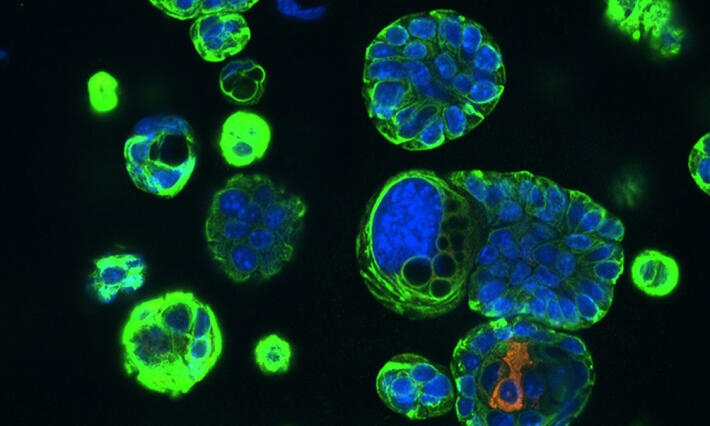On February 2016, Tara Wilkes left her job as a decorator and furniture sales associate, locked the door of she and her husband's second home on Lake Waccamaw and moved back inland to the family home in Rockingham, North Carolina, for good.
The then-54-year-old was tired all the time. She could no longer wear her rings because her fingers were always swollen and one of her shoulders hurt. She attributed this to walking a 40,000-square-foot showroom, daily, and she figured she’d pulled her rotater cuff carrying heavy fabrics up and down the stairs of her clients’ coastal homes. But her local physician couldn't find anything wrong with her shoulder.
Not long after, while out shopping in Pinehurst, NC, and her shoulder still ailing, she turned jaundiced — her pale skin was suddenly noticeably yellow. She went straight to the ED. An astute doctor had connected her shoulder pain to a possible gallbladder problem and ordered an endoscopy — a nonsurgical procedure used to examine the digestive tract. Her gallbladder as it turned out, was indeed damaged. It was due to the pancreatic tumor nearby pressing against it.
Tara was referred to Duke surgeon Sabino Zani Jr., MD, and Duke Cancer Institute oncologist Niharika Mettu, MD, PhD. She underwent five-and-a-half weeks of radiation and chemotherapy (in pill form), and in June that year underwent Whipple surgery (a pancreaticoduodenectomy) — a complex procedure during which the head of the pancreas is removed along with a portion of the bile duct, gallbladder, and the first portion of the small intestine. After 13 once-a-week IV chemotherapy treatments after surgery, Tara was told, just in time for Christmas 2016, that there was no evidence of disease.
“One of the things that Dr. Mettu said to me, when I was cleared, was that it was time to start living my life again,” recalled Tara. The young grandmother, who turned 55 that October, went out and did that.
She spent the next year, 2017, doing what she loved, including going to the beach, taking walks, playing with her grandchildren, visiting elderly shut-ins, restoring furniture, and painting. She painted a giant sunflower onto a barn door on her property, and hand-painted pillows and oven mitts as Christmas gifts for family and friends that have taken care of her and prayed with her through her cancer “ordeal.” She and her devoted husband and designated caregiver Neal hosted a Christmas party at their house that year.
Cured
That was the abridged version of Tara Wilkes' cancer story (written for the Duke Cancer Institute blog in January 2018), the genesis of which was a message from Neal Wilkes.
“Tara would love to talk and has a story to share,” wrote Neal in an email. “Tara has a deep faith in God, many prayers, and a great team of doctors. God led us to Duke and this was and is the key to her success.”
Following the publication of that article, the couple sent this message: “Hopefully this will inspire others with this dreadful cancer.”
Dr. Mettu couldn't give a prognosis for Wilkes (Tara) at the time, except to say that she and the other patient featured in that same article (Dolly Dunnagan) "had done well, perhaps better than average.”
“I am always inspired by the optimism of my patients with pancreatic cancer; so many of my patients find the ability to make the best of this situation and are very much invested in helping to further our treatments for this disease by participating in research that will move the needle forward in pancreatic cancer,” she said.
In October 2021, Dr. Mettu reached out to share some good news: “You had previously written about Ms. Tara Wilkes in 2018. She is now five years out from completing her therapy for pancreatic cancer and is disease-free, and what we would consider cured.”
The only drug Tara had regularly taken over the past five years was Vitamin D and Calcium.
On December 6, 2021, four years since we'd last corresponded via email and phone, Tara, her husband Neal, and I (the author of the article) reunited over Zoom — to celebrate the milestone of reaching that magic number 5, and to spread the word about pancreatic cancer for a new article.
They caught me up on the last few years.
“We've been camping and we spend time with the grandchildren. And, of course, we do a lot in the yard and things like that,” said Tara, who turned 60 in October.
The couple’s four grandchildren, all of whom live in state, are of course growing fast and there’s a fifth on the way, they shared.
Tara and Neal still live on the same lake in Rockingham. They mentioned that they now have a pontoon boat that they take out often. And that they also bought a little pop-up camper — Tara handled the remodeling and interior decorating. Together they’ve traveled and camped in their favorite spots, like Travelers Rest at the foothills of the Blue Ridge Mountains in South Carolina, Bodie Island in the Outer Banks of North Carolina, and scenic overlooks in the Georgia mountains.







